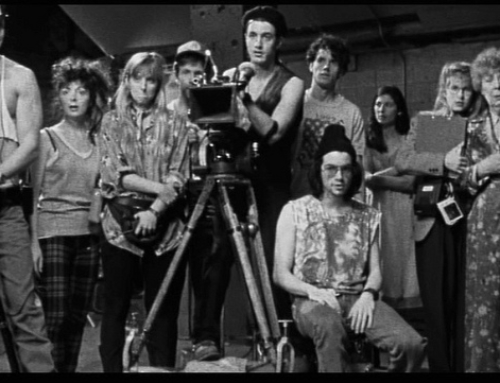It is not often that a film evokes such a response from me that I write a late-night blog entry immediately after seeing it. For whatever faults it may have (and it has its share), Prometheus is such a film. Below are my thoughts, and plenty of spoilers; I do recommend seeing it to any fan of sci-fi, so you should do so before reading this.
It’s worth noting that I have avoided all pre-release press of Prometheus, in accordance with my policy of “going in blind” whenever possible. All I knew was that it was a prequel to Alien, a film that would easily make my top-ten list for either horror or sci-fi films. This is, incidentally, a distinction its sequel doesn’t share; for all of its popcorn fun, Aliens took a singularly terrifying lifeform and turned it into mere cannon fodder, effectively killing the franchise before it had a chance to get off the ground – not that it really needed to be a franchise to begin with.
Prometheus easily avoids this by being a prequel. If space marines exist in 2093, they’re far away from the events portrayed here. If the film has a weakness, it’s that it hems too close to its predecessor. After a stunning cold open in which an alien seemingly uses his own body as a catalyst to create life on earth, we’re right back to the set-up of Alien; a rag-tag crew on a mysterious mission to a distant world, sponsored by a nefarious corporate entity. There they find a dead race, and some mysterious capsules which they think it’s just a swell idea to stick their faces into. You know the drill. I was already predicting (correctly, as it turned out) the first deaths before we hit the ten minute mark. Dr. Elisabeth Shaw is simply a more intellectual take on Ripley, and the android David is so archetypal that one wonders why we haven’t advanced our view on artificial life in the 30 years since Alien came out.
Yet none of this prevented me from being genuinely engaged by the film for nearly all of its running time. Because while fundamentally conservative when compared to its predecessor, the film was simultaneously daring relative to contemporary blockbusters. There hasn’t been a film like Alien since Alien itself; it’s well documented that the only reason Alien even got made was because it was the only sci-fi script Fox has lying around after the unexpected success of Star Wars. But while Alien was a horror film first and foremost, Prometheus is, at its heart, at least as much a science fiction film as anything else, and this is a minor miracle. When was the last time a major Hollywood studio released a big-budget science fiction film that wasn’t just an action movie? I honestly can’t say – Twelve Monkeys is the best I can come up with, and that’s A. hardly a blockbuster and B. 17 years old. The death of genuinely thoughtful science fiction seems to have correlated with society’s increasing apathy with and distrust towards science as a whole; it’s been relegated to the realm of academics and engineers, it’s not sexy, and people don’t have faith that it can save us.
Prometheus has the gumption to tackle issues of science and faith. It never does so in a way that is particularly deep, but it also doesn’t insult our intelligence, and to lay it on any thicker would derail the rest of the film. In what will almost certainly be the most daring scene of any major summer release, our heroine is saved from a deadly alien fetus by instructing an automatic surgical platform to perform an abortion on her, a scene in which her life is directly saved by advanced technology while implicitly tying this technology to death. Okay, maybe that’s too academic a reading; but the accomplishment is that the film both allows and rewards divergent readings of its subject matter, and the fact that it avoids coming out and answering the big questions it poses is the smartest thing it could have done. On a less metaphysical level, the android David gets more screen time and character development than anyone save Dr. Shaw. Whereas Alien‘s Ash was just a plot twist waiting to happen, David is integral to the story and the feel of the film; an early scene that shows David entertaining himself on the ship while all the other crew members remain in cryostasis is easily one of its best.
Ultimately, Prometheus ends on a note of disappointing; while the natural flow of the narrative is for all the characters to wind up dead from the alien menance, a number of them survive, only to have the writers kill them off anyway because they want to keep the whole “ONLY THE LADY SURVIVES” thing going. It tries to have its cake and eat it too, switching from certain doom to heroic sacrifices to a head-shaking “bitch archetype gets her comeuppance” moment to an inevitable set-up for a potential sequel. It’s not an awful ending, but simply a dissapointingly traditional one from a film that seemed happy to avoid the arbitrary explosions viewers have come to expect from a blockbuster. But as it lays the foundation for a revival of its franchise, it also lays the foundation for future science fiction films. Who knows; soon, we may actually get a major sci-fi film where no shots are fired. Until then, I imagine independent cinema will carry the torch; and with at least a few movies of the caliber of Moon or Cold Souls coming out an annual basis, that’s hardly a bad thing. But once upon a time, Hollywood produced some genuinely good sci-fi, and I’m hoping that Prometheus is the start of a trend, rather than a shot in the dark.



“[..] one wonders why we haven’t advanced our view on artificial life in the 30 years since Alien came out.”
Good question. – Perhaps it’s because we’re still afraid of the true scope and meaning of our own intelligence?
There’s nothing truly groundbreaking in the movie. Even the scene of David passing time on the ship feels like a short version of “Moon”!
Generally, I thought the movie was full of dubious ideas; review notes at my site.
Henry Swanson